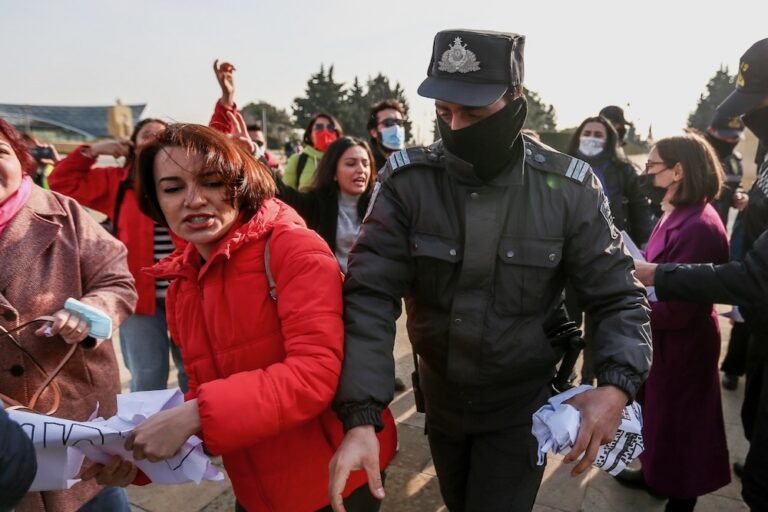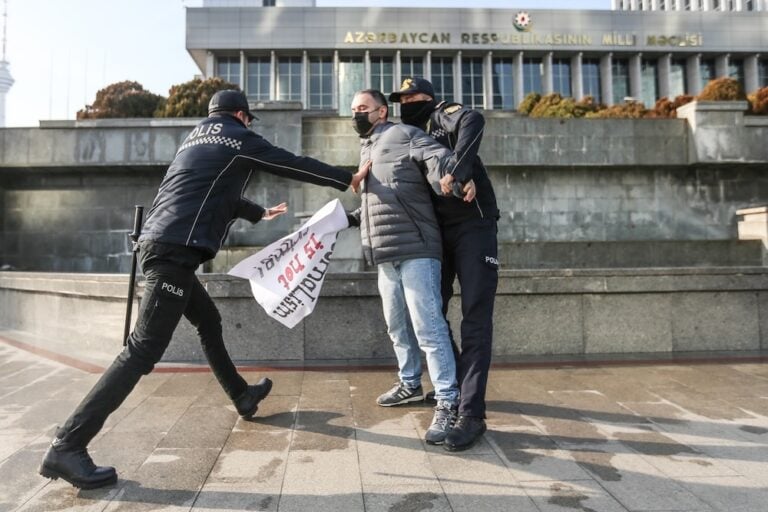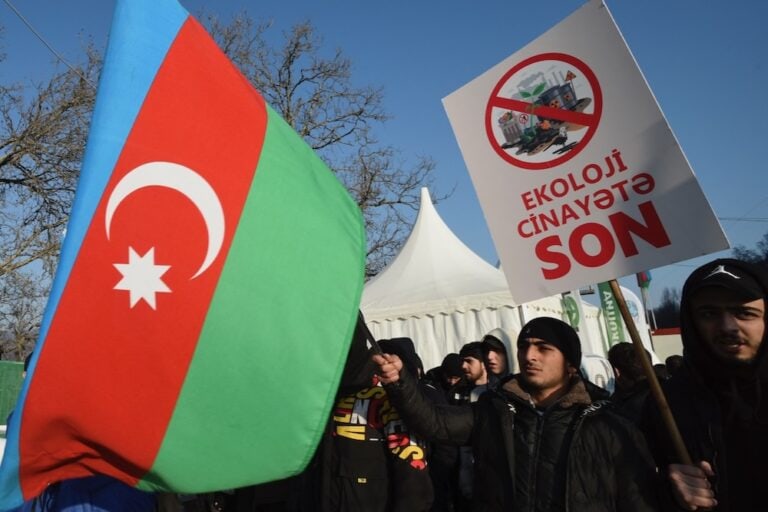(IRFS/IFEX) – The following is a 22 November 2007 IRFS press release: ANALYSIS: WHY DEFEND NAZIM GULIYEV? 22 November 2007, Baku, Azerbaijan – In recent days, the Institute for Reporters’ Freedom and Safety has come under fire for including “Ideal” newspaper chief editor Nazim Guliyev in its list of wrongfully imprisoned journalists in Azerbaijan and […]
(IRFS/IFEX) – The following is a 22 November 2007 IRFS press release:
ANALYSIS: WHY DEFEND NAZIM GULIYEV?
22 November 2007, Baku, Azerbaijan – In recent days, the Institute for Reporters’ Freedom and Safety has come under fire for including “Ideal” newspaper chief editor Nazim Guliyev in its list of wrongfully imprisoned journalists in Azerbaijan and defending him.
As we noted in a 7 November statement, “IRFS is aware that ‘Ideal’ newspaper has, on numerous occasions, previously violated journalistic ethics, and as a result has faced several lawsuits. At the same time, despite this reputation, IRFS maintains the principal position that journalists should never be imprisoned for what they write.” IRFS also notes this position complements the position reflected in Article 10 of the European Convention of Human Rights, which reads that freedom of expression “shall include freedom to hold opinions and to receive and impart information and ideas without interference by public authority and regardless of frontiers”.
In IRFS’ opinion, some forces are using Guliyev’s case to dampen local and international calls for Azerbaijan to decriminalize defamation and to stain the entire local journalist community. This cannot be tolerated. All local and international organizations with the goal of preserving journalists’ rights and freedom of expression need to universally condemn the imprisonment of any journalist for what they write. At the same time, IRFS believes that local and international organizations can simultaneously call for improved professionalism among journalists and better mechanisms to stop the operations of publications and/or journalists that repeatedly violate ethical norms. As we wrote in the 7 November statement, IRFS believes “that criminal responsibility for libel and defamation should be replaced with administrative sanctions such as fines and/or the publication of a refutation”.
Some parties would like to claim that it is not acceptable to defend Guliyev, because he is a “crook” or criminal. IRFS has two responses to this. First of all, IRFS would like to point out that the word “crook” is used to refer to a person who has committed larceny. Therefore, the logic follows that if Guliyev had committed larceny he should not be prosecuted under articles 147 and 148 of the Criminal Code for libel and defamation, but rather under Azerbaijan’s legislation for larceny. Regardless of the validity of the use of such terms, IRFS believes there is no moral justification or legal basis to infringe upon Guliyev’s right to freedom of expression.
Second, IRFS notes that it is true Guliyev has one prior conviction in 2002 for “demanding a bribe”. He was sentenced to four and a half years of imprisonment, but released in 2005 through a pardon. At the same time, “Ideal” newspaper claims that Guliyev was framed, and due to a complete lack of an independent judiciary in Azerbaijan, as is noted in the reports of countless local and international organizations, it is extremely difficult to put such convictions in context.
Regarding the more recent accusations against “Ideal” newspaper and Guliyev, IRFS does not deny that such accusations could be true. However, until formal evidence is presented, such allegations can only be deemed hearsay. IRFS welcomes an investigation into Guliyev and “Ideal”, and calls for anyone with incriminating evidence against them to come forth. If Guliyev has committed a crime (that would be other than the “crimes” of libel and defamation), IRFS fully supports criminal prosecution of Guliyev to the fullest extent of the law. This, however, will not change IRFS’ position that Guliyev was wrongfully imprisoned on 6 November through Azerbaijan’s criminal libel and defamation laws.
IRFS would also like to take this opportunity to point out that Guliyev’s case is evidence that journalists thought to be violating ethical norms are not reformed through prison terms. As we noted above, we feel it is much more effective to institute financial sanctions against publications and journalists violating ethical norms, and to ultimately shut down for a concrete period of time publications that cannot conform to ethical norms. In the case of Guliyev, this would have prevented him from returning to the “Ideal” newspaper, where he allegedly went back to the unethical ways which may have led to his first criminal conviction in 2002.
Some parties claim that Guliyev “is not a journalist”. In response to this, IRFS notes that, as the chief editor of “Ideal” newspaper, Guliyev not only wrote countless articles for his newspaper, he was also directly involved in the production of the “Ideal” newspaper – a daily publication registered with the Justice Ministry, that gives coverage of politics and social issues within the country and has a circulation of 5,000.
Our examination of Guliyev’s case reveals several shortcomings in the journalism community of Azerbaijan. The first would be the low professionalism of journalists in Azerbaijan; the fact that as the chief editor of a daily newspaper Guliyev repeatedly allowed publication of articles violating journalism ethics proves this.
Another concern would be the application of double standards by human rights and journalists’ organizations. These organizations must be aware that there cannot be a different set of laws or rights for people who are deemed “bad”. As is stated in Article 14 of the European Convention, “The enjoyment of the rights and freedoms set forth in this Convention shall be secured without discrimination on any ground such as sex, race, color, language, religion, political or other opinion, national or social origin, association with a national minority, property, birth or other status.” IRFS believes that in lieu of discrimination, there must be a universal call for the abolishment of criminal responsibility for libel and defamation, effective legislation and the proper interpretation and application of that legislation.
IRFS is also concerned that there was no mechanism to eliminate “Ideal”‘s ethical transgressions prior to Guliyev’s imprisonment. Some mass media have proposed that the Press Council be granted broader powers to fine and even temporarily shut down newspapers that consistently violate ethical norms. In IRFS’ opinion, such suggestions urgently need to be explored.
In closing, IRFS hopes that local and international organizations will seriously consider what is written in the statement, and that we can all unite to call for the unconditional decriminalization of libel and defamation and an increase in the professionalism of journalists in Azerbaijan.


